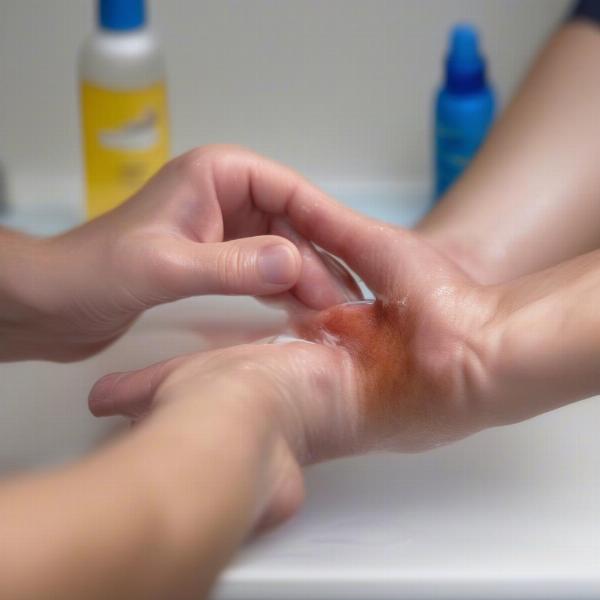The term “mad dog shot” is often used colloquially to refer to the rabies vaccine for dogs. While the term may conjure up images of aggressive, foaming-at-the-mouth canines, it’s crucial to understand that rabies vaccination is a vital preventative measure for all dogs, protecting them from a deadly virus and safeguarding public health. This article will delve into the importance of the rabies vaccine, debunk common myths, and address frequently asked questions.
Rabies is a viral disease that affects the central nervous system of mammals, including dogs and humans. It’s transmitted primarily through the saliva of an infected animal, usually via a bite. Without prompt treatment, rabies is almost always fatal. That’s why the “mad dog shot,” or rabies vaccine, is so critical. It provides your dog with immunity against this devastating disease.
Why is the Rabies Vaccine So Important?
The rabies vaccine isn’t just about protecting your furry friend; it’s about protecting the entire community. Rabies is a zoonotic disease, meaning it can be transmitted from animals to humans. By vaccinating your dog, you’re breaking the chain of transmission and preventing the spread of this deadly virus. In many regions, rabies vaccination for dogs is legally required, reflecting its importance in public health.
Debunking Common Myths About the “Mad Dog Shot”
There are several misconceptions surrounding the rabies vaccine. One common myth is that only outdoor dogs need the vaccine. This is false. Even indoor dogs can be exposed to rabies, for example, through contact with bats or other wildlife that may enter the home. Another myth is that the vaccine is dangerous and can cause harmful side effects. While some minor side effects like mild fever or soreness at the injection site are possible, serious reactions are extremely rare. The benefits of the vaccine far outweigh the risks.
Rabies Vaccination Schedule and Procedure
The initial rabies vaccine is typically given to puppies around 12-16 weeks of age, followed by a booster shot one year later. After that, the frequency of booster shots depends on local regulations and the type of vaccine used. Your veterinarian can advise you on the appropriate vaccination schedule for your dog. The procedure itself is quick and relatively painless. The vaccine is usually injected subcutaneously, meaning just under the skin.
What to Do if You Suspect Rabies Exposure
If your dog is bitten by a wild animal or a dog with unknown vaccination status, seek immediate veterinary attention. Even if your dog is vaccinated, a booster shot may be recommended. If you are bitten or scratched by an animal you suspect may have rabies, wash the wound thoroughly with soap and water and seek medical attention immediately.
 Caring for a dog bite wound
Caring for a dog bite wound
Conclusion
The “mad dog shot,” more accurately termed the rabies vaccine, is a crucial element of responsible dog ownership. It protects not only your beloved companion but also contributes significantly to public health. By understanding the facts and debunking the myths, we can ensure that all dogs receive this life-saving vaccination.
FAQ
-
When should my puppy get its first rabies vaccine? Puppies usually receive their first rabies vaccine around 12-16 weeks of age.
-
How often does my dog need a rabies booster? Booster frequency depends on local laws and the type of vaccine; consult your veterinarian.
-
Is the rabies vaccine safe? Yes, the rabies vaccine is generally safe, with minor side effects being rare.
-
What if my dog is bitten by a wild animal? Seek immediate veterinary care, even if your dog is vaccinated.
-
Can indoor dogs get rabies? Yes, even indoor dogs can be exposed to rabies.
-
Is rabies fatal? Without treatment, rabies is almost always fatal in both animals and humans.
-
What are the symptoms of rabies in dogs? Symptoms can include behavioral changes, paralysis, and excessive salivation.
Related Articles:
About ILM Dog:
ILM Dog is your trusted source for expert advice on all aspects of dog care, from breed selection and puppy care to senior dog health and training. We provide evidence-based information to help you navigate the joys and challenges of dog ownership, empowering you to make informed decisions about your furry friend’s wellbeing. For any questions or inquiries, contact us via email at [email protected] or phone at +44 20-3965-8624.